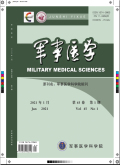军事医学2024,Vol.48Issue(8):572-578,7.DOI:10.7644/j.issn.1674-9960.2024.08.003
G蛋白通路抑制因子2促进肝癌细胞HepG2增殖和迁移
GPS2 promotes proliferation and migration of HepG2 cells
摘要
Abstract
Objective To explore the effect of G-protein pathway suppressor 2(GPS2)on the proliferation and migration of HepG2 cells and the underlying mechanism.Methods GPS2 expression was analyzed via The Cancer Genome Atlas(TCGA)and Clinical Proteomic Tumor Analysis Consortium(CPTAC)online database.HepG2 cells with stable knockdown or overexpression of GPS2 were established with lentivirus.The protein and mRNA expression levels of GPS2 were detected by Western blotting and real-time quantitative PCR(qPCR)while cell proliferation was verified by cell proliferation assay.Cell migration was tested by Transwell and scratch assay.Epithelial-mesenchymal transition(EMT)biomarkers and the expression of matrix metalloproteinase(MMP)were detected by qPCR.Finally,the expressions of phosphorylation of protein kinase B(AKT)(p-AKT)and phosphorylation of extracellular signal-regulated kinase(ERK)(p-ERK)were detected by Western blotting.Results Based on the analysis of TCGA and CPTAC online database,GPS2 was highly expressed in human liver cancer tissues.Knockdown of GPS2 inhibited the proliferation and migration of HepG2 cells,while overexpression of GPS2 promoted the proliferation and migration of HepG2 cells.Silence of GPS2 up-regulated the mRNA level of E-cadherin(E-CAD),down-regulated the mRNA levels of N-cadherin(N-CAD),Vimentin(VIM),MMP2 and MMP9,and reduced the p-AKT and p-ERK.In contrast,overexpression of GPS2 decreased the mRNA level of E-CAD,increased the mRNA levels of N-CAD,VIM,MMP2 and MMP9,and elevated the protein levels of p-AKT and p-ERK.Conclusion GPS2 can promote the proliferation and migration of HepG2 cells,which might be attributed to increased activation of MAPK/ERK and PI3K/AKT signaling pathways and the EMT process.关键词
G蛋白通路抑制因子2/HepG2细胞/细胞增殖/细胞迁移/上皮间质转换/基质金属蛋白酶Key words
G-protein pathway suppressor 2/HepG2/cell proliferation/cell migration/epithelial-mesenchymal transition/matrix metalloproteinase分类
医药卫生引用本文复制引用
陆莹,向慎思,詹轶群,杨晓明,尹荣华..G蛋白通路抑制因子2促进肝癌细胞HepG2增殖和迁移[J].军事医学,2024,48(8):572-578,7.基金项目
国家自然科学基金项目(82170403) (82170403)

